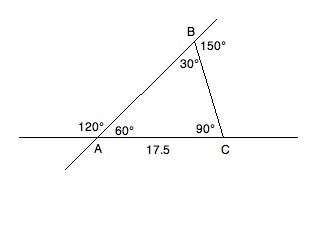All PSAT Math Resources
Example Questions
Example Question #1 : How To Find The Perimeter Of A Right Triangle
Three points in the xy-coordinate system form a triangle.
The points are 
What is the perimeter of the triangle?
Drawing points gives sides of a right triangle of 4, 5, and an unknown hypotenuse.
Using the pythagorean theorem we find that the hypotenuse is 
Example Question #2 : How To Find The Perimeter Of A Right Triangle

Based on the information given above, what is the perimeter of triangle ABC?

Consult the diagram above while reading the solution. Because of what we know about supplementary angles, we can fill in the inner values of the triangle. Angles A and B can be found by the following reductions:
A + 120 = 180; A = 60
B + 150 = 180; B = 30
Since we know A + B + C = 180 and have the values of A and B, we know:
60 + 30 + C = 180; C = 90
This gives us a 30:60:90 triangle. Now, since 17.5 is across from the 30° angle, we know that the other two sides will have to be √3 and 2 times 17.5; therefore, our perimeter will be as follows:
Example Question #1 : How To Find If Right Triangles Are Similar
In the figure above, line segments DC and AB are parallel. What is the perimeter of quadrilateral ABCD?
75
80
90
85
95
85
Because DC and AB are parallel, this means that angles CDB and ABD are equal. When two parallel lines are cut by a transversal line, alternate interior angles (such as CDB and ABD) are congruent.
Now, we can show that triangles ABD and BDC are similar. Both ABD and BDC are right triangles. This means that they have one angle that is the same—their right angle. Also, we just established that angles CDB and ABD are congruent. By the angle-angle similarity theorem, if two triangles have two angles that are congruent, they are similar. Thus triangles ABD and BDC are similar triangles.
We can use the similarity between triangles ABD and BDC to find the lengths of BC and CD. The length of BC is proportional to the length of AD, and the length of CD is proportional to the length of DB, because these sides correspond.
We don’t know the length of DB, but we can find it using the Pythagorean Theorem. Let a, b, and c represent the lengths of AD, AB, and BD respectively. According to the Pythagorean Theorem:
a2 + b2 = c2
152 + 202 = c2
625 = c2
c = 25
The length of BD is 25.
We now have what we need to find the perimeter of the quadrilateral.
Perimeter = sum of the lengths of AB, BC, CD, and DA.
Perimeter = 20 + 18.75 + 31.25 + 15 = 85
The answer is 85.
Example Question #131 : Plane Geometry


Which angle or angles must be complementary to 
I)
II)
III)
IV)
V)
I and III only
II only
IV only
II and V only
I only
II and V only




Since 








The correct response is II and V only.
Example Question #1 : How To Find If Right Triangles Are Similar

Refer to the above figure. Given that 

By the Pythagorean Theorem,
The similarity ratio of 


which is subsequently the ratio of the perimeter of 

The perimeter of 

so the perimeter of 
Example Question #2 : How To Find If Right Triangles Are Similar

Note: Figure NOT drawn to scale.
Refer to the above figure. Given that 

The correct answer is not among the other responses.
By the Pythagorean Theorem,
The similarity ratio of 


This can be used to find 
The area of 
Example Question #1 : Right Triangles

Note: Figures NOT drawn to scale.
Refer to the above figure. Given that 

By the Pythagorean Theorem, since 

The similarity ratio of 


Likewise,
Example Question #1 : How To Find The Length Of The Side Of A Right Triangle
A right triangle has one side equal to 5 and its hypotenuse equal to 14. Its third side is equal to:
171
13.07
12
14.87
9
13.07
The Pythagorean Theorem gives us a2 + b2 = c2 for a right triangle, where c is the hypotenuse and a and b are the smaller sides. Here a is equal to 5 and c is equal to 14, so b2 = 142 – 52 = 171. Therefore b is equal to the square root of 171 or approximately 13.07.
Example Question #101 : Plane Geometry
Which of the following could NOT be the lengths of the sides of a right triangle?
14, 48, 50
8, 15, 17
12, 16, 20
5, 7, 10
5, 12, 13
5, 7, 10
We use the Pythagorean Theorem and we calculate that 25 + 49 is not equal to 100.
All of the other answer choices observe the theorem a2 + b2 = c2
Example Question #12 : Right Triangles
Which set of sides could make a right triangle?
6, 7, 8
10, 12, 16
9, 12, 15
4, 6, 9
9, 12, 15
By virtue of the Pythagorean Theorem, in a right triangle the sum of the squares of the smaller two sides equals the square of the largest side. Only 9, 12, and 15 fit this rule.
Certified Tutor
All PSAT Math Resources























































